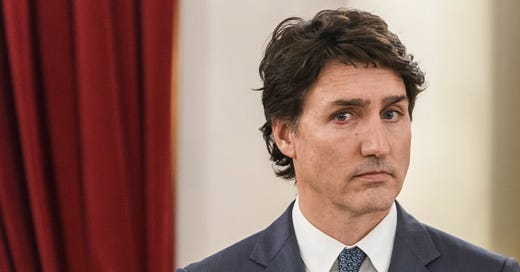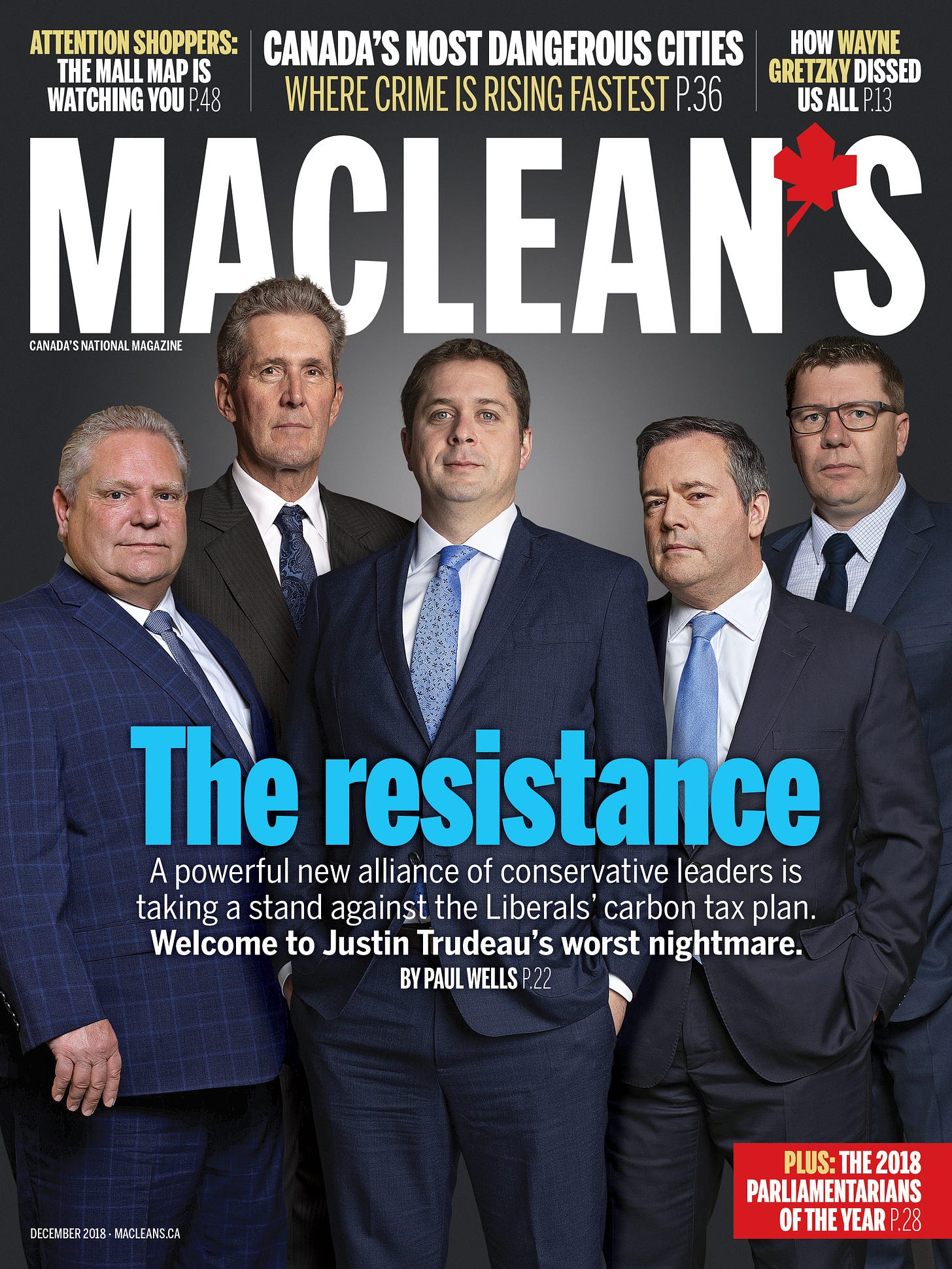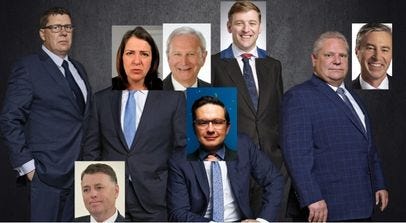Justin Trudeau is amazed to find himself surrounded by people who want to be liked.
“I think Mr. Furey is continuing to bow to political pressure,” the prime minister said on Friday. Mr. Furey is Andrew Furey, the premier of Newfoundland and Labrador, who has joined six other premiers in calling for a pause on planned increases to the federal carbon tax and its attendant rebates.
Seven premiers against a policy is a problem. When one of them is a Liberal, it’s especially vexing, for reasons explained in the Parable of the Prodigal Son.
“I think Canadians in Newfoundland and Labrador and right across the country expect their governments to do the right thing,” Trudeau continued.
This is self-contradiction of admirable compactness. If boosting the carbon tax (and rebate!) is the right thing… and Canadians expect governments to do the right thing… then why’s the political pressure going against a carbon tax (and rebate!) hike?
But syllogisms are hard. We are left, as we often are, with the spectacle of an elected leader accusing a colleague of something he would never admit to doing. Oh, Andrew, the PM thinks mournfully. You have bowed to political pressure. What’s worse, Furey is a Liberal, indeed the only provincial premier in the country who holds a Liberal card. Liberals are always surprised when other Liberals surrender to political calculations.
But here again, the longer Trudeau talked, the more surprising his argument became. What’s the “right thing” that Canadians expect their governments to do? Save the planet? Build the low-carbon economy of the future? No, the PM’s main argument was that staying with the carbon tax (and rebate!) will help people buy groceries. “It’s about being there to support Canadians during the affordability crisis.”
“It’s basic math,” he said. “The Canada Carbon Rebate helps out 80 per cent of Canadians with more money than they pay in terms of a price on pollution."
So cancelling the tax (and rebate!), or holding it/them at current levels, would actually mean “less money in the pockets of 8 out of 10 Canadians.”
This is something “nobody is talking about,” he said.
Honestly, it’s easy to understand his frustration. People who have looked at the tax-and-rebate scheme agree that many families would receive a greater rebate than they would pay in tax. The Parliamentary Budget Officer reached that conclusion, sort of, although his analysis permitted many interpretations, a situation that plainly frustrated the Parliamentary Budget Officer.
As a late arriver to the notion that governments should resist doing popular things, Trudeau hasn’t yet perfected his pitch. Here he was essentially arguing that the right thing, which only tough governments do, actually delivers a cash bonanza. I’m not sure that conveys the sense of ascetic discipline he was aiming for.
If his climate policy is really an affordability policy, why be timid? Instead of merely proceeding with planned increases to the tax (and rebate!) on April 1 from $65 per tonne to $80, why not kick it up to $200 or $500? Here, Canada, let me help.
This is a longstanding problem with the tax-and-rebate scheme, from the standpoint of marketing, tactics, ground-level politics, what have you. If the personal advantage in the rebates were as clear to everyone as they are to Trudeau, people would be clamouring for more rebates. I wrote that more than five years ago, when Trudeau first announced the rebate part. Since the tax-and-rebate thing is imposed by Ottawa in some provinces but not all, then surely residents of the provinces that escaped the tax-and-rebate mechanism because their provincial governments had their own robust policies would start to demand membership in the Trudeau plan. This… hasn’t been happening.
In fact, there are more provinces hooked up to the federal tax-and-rebate mechanism since 2018 — Prince Edward Island, Nova Scotia and Furey’s Newfoundland and Labrador have been added in the intervening years, their local climate policies having been found wanting by the feds. But I don’t think you can reasonably argue it’s because voters in those provinces were eager to get their rebates.
A little later in 2018, I wrote about an effort by Conservative politicians to dissuade Trudeau from his carbon-pricing plan, or defeat him in the next election. My colleagues came up with a striking cover illustration for that story that has stood, since then, as proof in some circles that I’m a fool.
The photo was Photoshopped from photos shot in a bunch of provincial capitals and Ottawa, and I didn’t write the cover line, though cover lines were always checked with writers and I didn’t object to this one. We were a pretty mischievous bunch over at the old mansion. I naively thought some people would read the actual story that I actually wrote, which featured an interview with Catherine McKenna alongside comments from a bunch of blue meanies and which had all sorts of language indicating uncertainty about the future. I believe the actual words in the actual article stand up well today.
“It’s not axiomatic that just because Canada’s conservative parties are lining up behind this issue, they are sure of winning on it. Trudeau has read his share of premature political obituaries before now… And the Liberals believe that since the 2008 campaign, when Harper soundly defeated Stéphane Dion on this same issue, Canadians have had a decade to get much more worried about climate change.”
Anyway, since 2018, Trudeau’s climate plans have been “tested,” to use my preferred word in that article, twice. He won both elections. Three of the five dudes in that cover photo are no longer leading their parties. It turns out there is yet another test in store, the cast of opponents has grown, and the faces include one Liberal. Sadly, Photoshop is one of the things I’m worst at, so this is the best I could do on short notice.
If I were an incumbent Liberal MP, I’d probably notice how eager Trudeau has been to contrast his policy plans with political popularity. “My job is not to be popular, although it helps,” he said in Calgary on Wednesday. “My job is to do the right things for Canada now, and do the right things for Canadians a generation from now.”
This is not a foolish thing to say. In fact, in different ways on different days, most voters hope they’ll be led by people who won’t be distracted by the polls. But as a rule of thumb, it’s easier to resist the polls when the polls are consistently terrible.
I’ll tell you who used to be really sure that unpopularity was a badge of political honour: Brian Mulroney. He was elected with the largest number of seats in history in 1984, but Meech/ Charlottetown/ GST/ free trade, along with a series of scandals that cost him a string of ministerial resignations, seriously eroded that popularity by the end of his tenure. So he started to draw an equation: Here’s a headline from an old newspaper story about this calculation.
“The beauty of historical judgment,” Mulroney says in that story, is this: "It bears no relationship to today's headlines.” In fact, he had come to believe, not only that unpopularity was a badge of honour, but that popularity was a badge of dishonour.
“The problems of industrialized society have become so complex and arcane,” Mulroney said then, “that if a leader leaves office on a wave of popularity he should be disqualified by history from any consideration for greatness, because it means that he failed to summon the courage to deal with the true problems of his time.”
I’m not in any particular mood to interrogate this theory closely. Mulroney’s funeral week still lies ahead, and it’s entirely fitting that the best parts of his legacy continue to be discussed.
One does get the impression that the coverage surrounding Mulroney’s death has had one attentive listener. Mulroney was only two years older then than Trudeau is now. The beauty of history’s judgment is that you can imagine what it’ll say while mere mortals are still writing the headlines.








I think we now know who helped Princess Kate with her Photoshopping. Keep your day job, Paul. :)
Honesty on all sides would be appreciated by this humble voter. Conservatives on provincial and federal scenes aren’t putting forward climate plans, so are being fundamentally dishonest with Canadians: they welcome voters to conclude that climate change is a hoax, or not so bad, or somebody else’s problem but not yours. Liberals are like Belgians: always waffling 😂: just as you say Paul, why not really go for a price on pollution? $85 a tonne doesn’t even register. A Saudi prince with the hiccups has more impact on the pump price. If climate change is The Big Problem, then tax every vanity pick-up truck at 100%, make gas $5 a litre, and make public transit free, frequent and comfortable.
But no. There will be no honesty in the offing. Just slogans all the way to 2025 and Kingdom come.